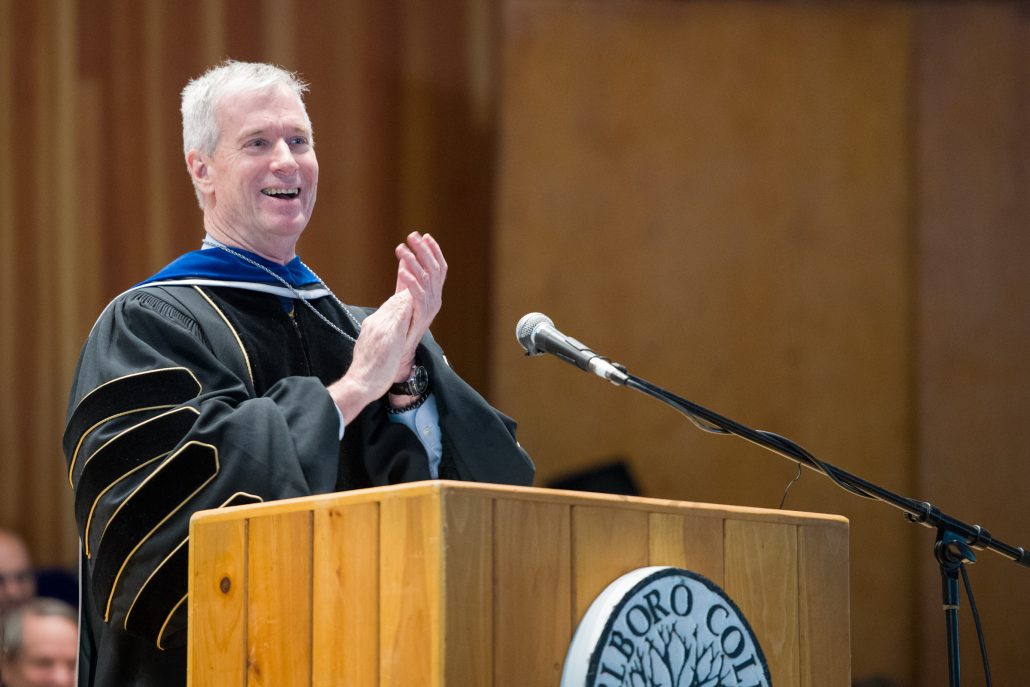President’s Remarks 2017
 Good morning and a very warm welcome to Marlboro College on this special day to celebrate our remarkable students’ accomplishments and wish them well on their journey ahead. As is becoming a tradition during my time here at Marlboro, I note that it has snowed!
Good morning and a very warm welcome to Marlboro College on this special day to celebrate our remarkable students’ accomplishments and wish them well on their journey ahead. As is becoming a tradition during my time here at Marlboro, I note that it has snowed!
Thank you, Dick for your tireless service to the college and willingness to assume the chairmanship of the board, leading our community during this time of renewal. In addition to our soon-to-be graduates, I especially welcome our trustees, former president Tom Ragle, parents, family, friends, faculty, Marlboro neighbors, and other honored guests. I also want to particularly thank all the mothers for sharing their day with us. Thank you all for being here today and being part of this event for recognition and gratitude.
I begin by expressing deep gratitude to the parents, family, faculty, staff, and other students who helped these graduates succeed. Many students have said that they would not have made it without your loving support. They, and I, thank you.
Today marks the college’s 70th commencement and just the second time we have held a joint undergraduate and graduate school commencement. Since the first joint commencement last May, the grad school relocated here to Potash Hill. It is wonderful to have them united with us. Now, both graduate and undergraduate programs can take advantage of this beautiful place built close to nature by our founder Walter Hendricks, using his family farm. This “clearing in the wood,” drawing on an apt metaphor from Walter’s teacher at Amherst, Robert Frost, provides an ideal setting to create a small, intentional learning community for the enduring purpose that is described in the College’s 1946 prospectus: “Marlboro College is being founded at a time when the survival power and value of democracy are challenged. Its first aim, therefore, is to develop citizens who will be effective in the task of making American democracy succeed.”
In these turbulent times, we again feel that our democracy is at risk. That feeling has been palpable here on campus since the fall. Everywhere we look, there is evidence that our democracy is unfinished, and that learning to be a good citizen is a never-ending and essential task. In these times, we simply can’t take citizenship—and what it takes for democracy to succeed—for granted. In NYT columnist Tom Friedman’s latest book, he provides an apt comment on these times by quoting two-time Nobel laureate Marie Curie: “Nothing in life is to be feared, it is only to be understood. Now is the time to understand more, so that we fear less.” Marlboro helps our students understand more.
Here at Marlboro, our responsibility is to ensure students not only graduate with an academic proficiency including critical thinking, quantitative skills, and the ability to write and communicate clearly, but perhaps more importantly that they have “the habits of the heart” that 19th-century French philosopher Alexis de Tocqueville suggested were essential for effective, engaged citizens.
At Marlboro, we are fortunate that community engagement that leads to effective citizenship is in our DNA. At bi-weekly Town Meeting, led by our students, the college community—faculty, staff and students—come together to deliberate and then act on essential community matters, each individual with equal voice and vote.
This process is often time-consuming and messy, and not everyone is satisfied with the process or the outcome. Despite that, it offers our students a chance to participate fully in the life of this learning community. In this very concrete way, they learn and then practice the skills needed to be an engaged citizen in a democratic society.
One of the great joys of being at Marlboro is to witness our students live their passions, learn new skills and grow into engaged citizens. And today’s program eloquently catalogues the extraordinary breadth of their interests: exploring ideas about food, leadership, technology, computer programming, art and consumer culture, the environment, political rhetoric, religious communication, animal behavior, to name just a few of the Plan and Capstone topics.
Dear Graduates, as you take this next step in life, the task of making our democracy succeed lies before you. Given what you have learned here and how you learned it, I believe that you are well prepared to become engaged citizens, connected to community, who will play a critical role in helping our democracy experience a rebirth.
Our Commencement Speakers: Solomon Botwick-Reis, Nicolas Ignancio Cardenas Tamburini, Gretchen Holbrook Gerzina, and Peter Welch embody the values of citizenship and service to community that are at Marlboro’s very core—and what our times require. In advance, I thank Solomon, Nico, Gretchen, and Peter for what I know will be inspiring words and even more for exemplifying models of citizenship in different communities: locally, regionally, nationally, and internationally.
On this your day, I conclude by congratulating the graduates of the class of 2017. All of us gathered here are extremely proud of you and have great expectations for the new graduates. So, dear graduates, strive to make the most out of what you have learned here, keep close to each other, and please stay connected to the college. Our college and country need you. We need you to be our best envoys letting others know about the distinctive quality of a Marlboro education and the difference that can make in helping our democracy succeed. Thank you and congratulations.

